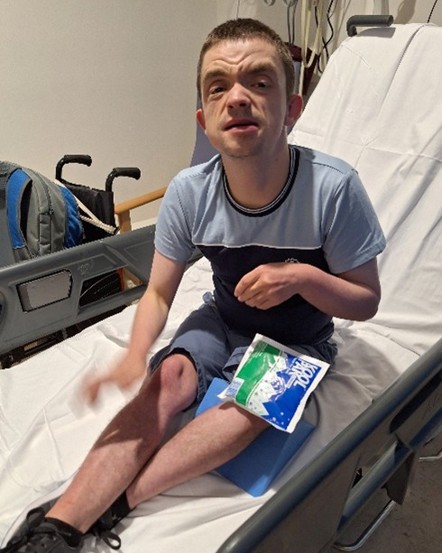Little Changes Can Lead to Big Tears

Ann Hickman
Mum to three, special educational needs writer and part-time tutor
David has always struggled with transitions. Sometimes it’s easy, sometimes it’s difficult and sometimes it’s a disaster.
Whether David likes it or not, he is going to have to spend a good deal of his life moving from place or place and task to task so it is something we are helping him learn.
A transition is when there is a change in a situation.
This could be not going to school because it is half term, going to the park with Granddad when you expected Grandma or going from playing a game to getting ready for a bath.
It was this last transition that became particularly tearful last night.
We are fairly routine with 'early warnings' in our home.
This is not the kind of warning I got from my Gran when I was being a bit naughty but a pre-emptive announcement of a change in activity.
"It's nearly time for a bath", I holler to the eldest and youngest playing in the lounge.
I then repeat the notice and sign it in Makaton for David, checking to see if he has understood.
He signs and grunts "Nah" for 'No' back to me so although he doesn't agree with my suggestion, I know it's been received. A few minutes later we repeat the process.
I let Anthony and David know it is nearly time for a bath and they will have to stop playing with their respective games and electronic devices soon and to go upstairs.
This is a way of setting expectations for the kids.
David's response, however, is the same. This time I confirm that 'yes' this is going to happen. Finally it is time to get ready for a bath.
Anthony and Jane reluctantly, but happily head for the stairs. David bursts into to tears and runs into the lounge.
One of the ways David calms himself is through a small routine with a set of toys, he will often then carry them through a transition if allowed i.e into the car, through to the dinner table etc.
I can see my small boy huddled in a corner with a small pile of toys that he is quickly flipping over in sequence.
Although gathering the toys is a way David has learned to cope with transitions it's not necessarily a long term solution and not one we have decided should extend to upstairs as it can create further problems in going to bed etc.
Instead, we encourage David to finish with the toys.
People with autism are driven by routine and being comfortable.
Having to stop preferred, comfortable activities in exchange for something like going for a bath is really difficult.
We have been helping him with this via an ABA type approach. We can now help David put the toys away, by setting an example and singing a song about putting the toys in the box. #
As I approached with the box and starting to sing, David knows what's coming.
He is crying loudly with tears streaming down his face.
David finishes a cycle of his routine and waits as I slowly wave goodbye to the toys and one by one gently move them into the box singing the same song.
David is holding on tight to the last toy. I very carefully pull his hand and move his clenched fist over the box.
He drops that last toy in. I look over at him and give him a big smile, and his tears give way to giggles of relief.
Well done David, you put the last toy back. Maybe it was because he was finally ready to.
I put the box away and David takes my hand as we head towards the stairs. Sometimes he needs help, sometimes he copes.
It's slowly becoming less of the first and more of the second.


